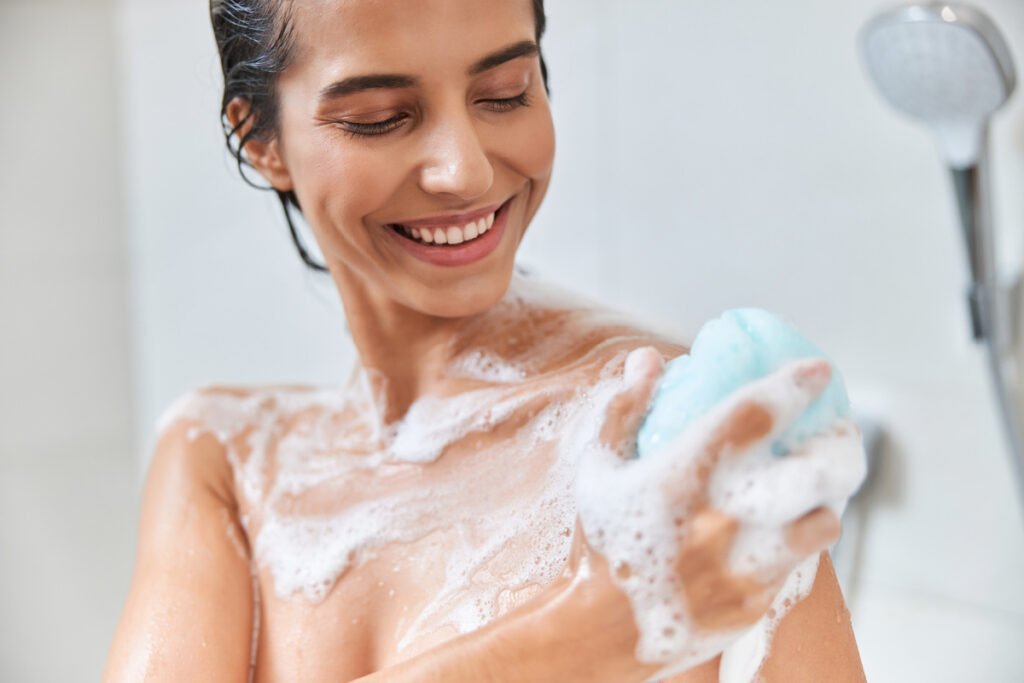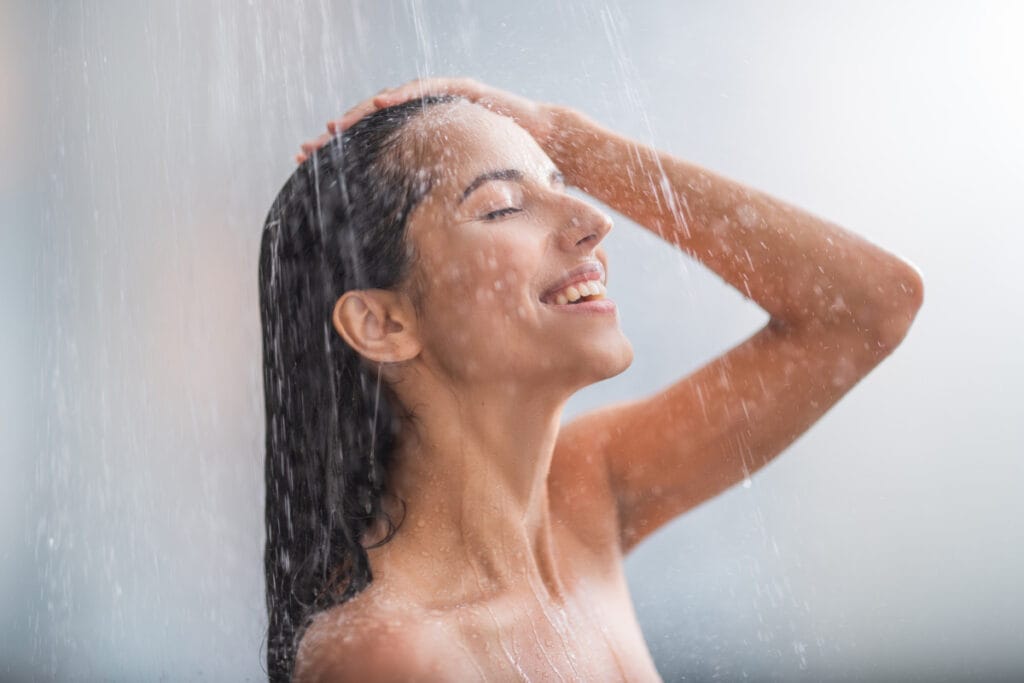Is Showering Every Day Bad For Your Skin?

About two thirds of Americans say they shower once per day. As long as you’re not showering more than that, you’ll avoid the negative side effects associated with skin that’s dried out from too much showering—but should you even be showering that much?
While showering every day isn’t bad for your skin per se, there can actually be some health benefits to gain from adjusting your schedule and showering less often, about 2-3 times each week. In this post, triple board-certified Seattle cosmetic surgeon Dr. Alex Sobel shares why showering less frequently, as well as cutting back on scalding water and soap, can actually support your skin’s health.
How often do I really need to shower or bathe?
By most accounts, you only need to shower 2-3 times a week. Daily showering is a cultural norm in the United States, but it isn’t necessary, and it differs from culture to culture. While it’s completely understandable that you want to avoid body odor, body odor doesn’t necessarily signify bad health and can be managed in a variety of ways—you don’t need a full shower to smell better.
Consider why you shower. We want to remove sweat, dirt, and excess oil, say after gardening, working with animals, or completing an intense workout. But if you spend a day working at a desk, at home, or otherwise not breaking a sweat, you are unlikely to need to remove excess dirt and oil.
Who needs to shower more (or less) often?
While 2-3 times per week works for many people, your ideal showering frequency depends on several factors:
Shower More Frequently (Daily or After Activity) If You:
- Exercise regularly: Rinse off after workouts to remove sweat and bacteria
- Work in a physically demanding job: Construction workers, landscapers, and others who work up a sweat daily should shower after work
- Live in a hot, humid climate: High heat and humidity increase sweating and oil production
- Have oily skin or acne-prone skin: Daily gentle cleansing may help manage excess oil (but avoid harsh soaps)
- Are exposed to allergens: If you have allergies or sensitive skin, a daily rinse can remove pollen, dust, and environmental irritants
- Work in healthcare or with vulnerable populations: Daily showering helps prevent spreading germs to immunocompromised individuals
Shower Less Frequently (2-3 Times Per Week) If You:
- Have dry or sensitive skin: Less frequent showering helps preserve your skin’s natural oils
- Are older (65+): Aging skin produces less oil and is more prone to dryness. Seniors often do well with 2-3 showers per week, with spot-cleaning on other days
- Live in a dry or cold climate: Winter air and indoor heating already dry out your skin
- Have eczema or psoriasis: Over-showering can trigger flare-ups of these inflammatory skin conditions
- Lead a sedentary lifestyle: If you’re not sweating or getting dirty, daily showers aren’t necessary
For Children and Teens:
- Toddlers and preschoolers (ages 2-5): Can bathe 2-3 times per week unless they’re particularly messy from play
- School-age children (6-11): Daily or every-other-day bathing is typical and appropriate, especially as they become more active. Increase to daily if they play sports, get visibly dirty, or start developing body odor (usually around age 8-9)
- Pre-teens and teens (12+): Should shower daily (or even twice daily if very active) once puberty begins due to increased oil production, sweat, and body odor
How much soap should I use on my skin?
While cutting back from daily showers may be a major change to your routine, cutting back on where you lather your soap is an easy way to save your skin! You do not need soap all over your entire body, every time you shower. Most of us can get away with a gentle soap in the underarms, the groin, the feet, and anywhere else you have skin-to-skin contact. (You should also, of course, wash your face with an appropriate cleanser for your skin type to remove any products and impurities!) Only using soap in the areas that need to be washed can help shorten your shower, too.
By only soaping the underarms, groin, and feet, you can help your skin retain moisture and shorten your showers.
If you’re noticing dehydrated skin, consider the type of soap that you use, as well. If you have sensitive or dry skin, use a gentle, fragrance-free cleanser to avoid over-drying (this goes for your face, too!). For most of us, a physically exfoliating loofah is not necessary; these can be another contributor to over-drying.
What is the best temperature for a shower or bath?
Rather than showering in the hottest water you can stand, shower in lukewarm water, or the coolest temperature you can stand. Scalding hot water is one of the worst culprits of dry skin, despite how common hot baths are. And dry skin, of course, can interfere with a healthy skin barrier. This is especially harmful if you have eczema.
Steaming hot water disrupts your skin barrier balance and leads to flaky, dehydrated skin.
Showering less often supports a healthy skin barrier
Your skin is a layered, complex organism that knows how to take care of itself, for the most part. If your skin feels tight or squeaky clean when you get out of the shower, that’s a sign that your skin has been over-dried by the hot water and soap. Avoid hot, soapy full-body showers in favor of rinsing off dirt and excess oil as needed, and this will benefit your skin in more ways than one:
1. Your skin microbiome will be healthier.
Too many hot showers with lots of soap may remove your natural skin oils and normal balance of good bacteria. Our immune systems are complex, and just like having a healthy gut microbiome, a healthy skin microbiome is beneficial not just for the appearance of your skin, but for your immune system. Exposure to bacteria on your skin throughout your life supports healthy immunity, a process called “acquired” or “adaptive” immunity.
It may be hard to believe that your skin’s health could be so important to your overall health. That’s because scientists are just starting to catch up to this reality. Research continues today to reveal how better understanding the microbiome can help us to better diagnose and understand inflammatory diseases of the skin, such as seborrheic dermatitis.
2. Daily showering can dry your skin out, especially if you use hot water.
Below your microbiome, you have an acid mantle that holds in moisture, among other functions. Dry or flaky skin is a sign that its protective nature may be compromised. Keep your skin hydrated and avoid showering so much that your “hygiene” is affecting your wellness.
While long, hot showers used to be considered “hygienic,” science is helping us understand that you can, actually, be too clean.
You may find that it’s helpful to cut back in winter. Cold winter temperatures and dry indoor heating make our skin drier, so cutting back on showering helps your skin stay hydrated. And as you grow older, your skin becomes thinner and drier, so you may find that you prefer to adjust your showering routine in order not to lose hydration.
If you only do one thing? Avoid hot, hot water. Scalding water dries out our skin, and simply isn’t necessary for your showers.
3. Showering daily uses unnecessary water.
As a bonus, shorter, less frequent showers save water from going down the drain! This will help to keep your water and electricity bill down, save time, and benefit the environment.

How do I know if I’m not showering enough?
Too little showering leads to accumulated dirt and oil, which can clog pores and cause acne and/or skin irritation. If you find that you are experiencing itching or yellow or red patches of skin, these could be signs that you are not showering enough; you may wish to consult a dermatologist if you are having trouble finding the right bathing routine to support your unique skin and lifestyle.
Visit Anderson Sobel Cosmetic Surgery for medical-grade skin treatments in Bellevue
If you are looking to upgrade your skin care routine in the Bellevue/Seattle area, consider incorporating medical-grade skin treatments. We offer gently exfoliating facials to treat a number of aging and skin concerns, such as chemical peels, laser treatments, and microdermabrasion. Call 425.453.9060 or contact us online to schedule your appointment today and begin the journey to your best skin ever.
2 Comments Posted to "Is Showering Every Day Bad For Your Skin?"
How often should a 62yrs 70yrs old take a bath
Hi Mongalo, For older adults, bathing every 2 to 3 days is usually enough to maintain hygiene without over-drying the skin—especially if the skin is prone to dryness or sensitivity. On days in between, a gentle rinse or sponge bath focusing on key areas (like underarms and groin) can help keep you feeling fresh and clean.